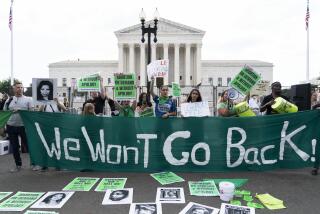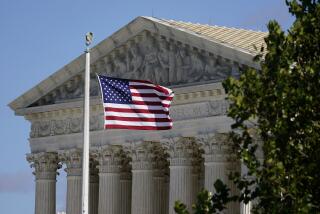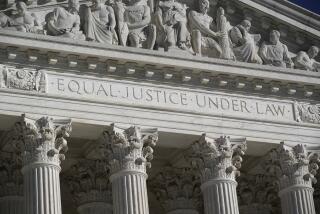Monks in Louisiana win right to sell handcrafted caskets
WASHINGTON — When the state Board of Embalmers and Funeral Directors told the Benedictine monks of St. Joseph Abbey in southern Louisiana they could not sell their handcrafted caskets to the public, the normally peaceful order took the fight to court.
Hurricane Katrina had wiped out the order’s traditional income from selling timber, so the brothers decided to market the simple cypress boxes they had long built to bury monks who died. They were priced at $1,500 or $2,000, far less than a funeral home would charge.
But the state board, composed mostly of embalmers and funeral home directors, ordered the monks to stop.
Their five-year legal battle ended quietly at the Supreme Court last week with a defeat for state-enforced “economic protectionism” and a victory for small entrepreneurs.
It is part of a growing trend of successful “economic liberty” cases championed by the Institute for Justice, a libertarian legal group based in Arlington, Va.
The ruling “puts the final nail in the coffin for the state board’s protectionist and outrageous campaign against the monks,” said Scott Bullock, a lawyer for the institute. The institute’s clients include food truck owners, street vendors, independent taxi drivers, flower sellers, hair braiders, winemakers and many others who have run up against state licensing laws or city regulations.
Since the 1930s, the Supreme Court has said the regulation of business is a matter for federal and state lawmakers, so long as the regulations serve a legitimate purpose. That may include protecting health or safety or preventing consumers from being cheated.
But the institute’s lawyers, who espouse the principles of free speech and free markets, argue that the Constitution’s protection for individual liberty includes a protection for making a living. And they have gone after regulations that seem designed only to protect established businesses from upstart competitors.
To win, they need judges who will take a skeptical look at licensing laws and other regulations. Judges “should not act as rubber stamps for the government,” Bullock said.
The Supreme Court has mostly stood aside. Last week, the justices refused to hear the state board’s defense of its ban on casket sales by those who are not licensed funeral directors. That left intact decisions by a federal judge and the 5th Circuit Court of Appeals in New Orleans, which had declared the state’s regulation unconstitutional.
“Mere economic protection of a particular industry” is not a “legitimate governmental purpose,” Judge Patrick Higginbotham said for the 5th Circuit. The monks had sued under the 14th Amendment, which says no state may “deprive any person of life, liberty or property without due process of law.”
Higginbotham said the monks were denied their right to make a living if the state board’s ban on casket sales had nothing to do with “the protection of public health, safety and consumer welfare.” It makes no sense, he concluded, to say that only a licensed funeral director with an embalming room could be trusted to sell a casket.
“The great deference due state economic regulation does not demand judicial blindness … nor does it require courts to accept nonsensical explanations for regulation,” Higginbotham wrote.
Because the Supreme Court did not rule directly, the case did not set a national precedent. But the institute has been steadily pressing and winning rulings in the lower courts.
It has lawsuits pending on behalf of food truck operators and street vendors in more than a dozen cities, including Chicago and Atlanta. The truck owners are fighting ordinances that make it illegal to park and sell food within several hundred feet of a restaurant or store that sells food. It is also challenging taxi regulations in Milwaukee; Denver; Portland, Ore.; and Tampa, Fla., that make it prohibitively expensive or impossible for qualified independent drivers to operate.
Eight years ago, its suit on behalf of a Virginia winemaker led to a 2005 Supreme Court ruling that cleared the way for small wineries to ship directly to consumers across the nation.
The Federal Trade Commission, which enforces antitrust laws, had already given consumers the right to buy caskets online to be shipped across state lines. But the Louisiana embalmers board said it could regulate casket sales within the state. After losing before the 5th Circuit, the board appealed to the Supreme Court, arguing that judges should not second-guess a state’s business regulations.
For St. Joseph Abbey, the case turned out better than the monks had hoped.
“I was hesitant at the beginning to file the lawsuit. But it’s the best thing that could have happened to our business,” said Abbot Justin Brown. “We had all this excellent publicity, and now we are selling more caskets that we had ever expected. I think a lot of people heard about our case against the funeral directors and decided to buy one of our caskets.”
More to Read
Start your day right
Sign up for Essential California for news, features and recommendations from the L.A. Times and beyond in your inbox six days a week.
You may occasionally receive promotional content from the Los Angeles Times.







